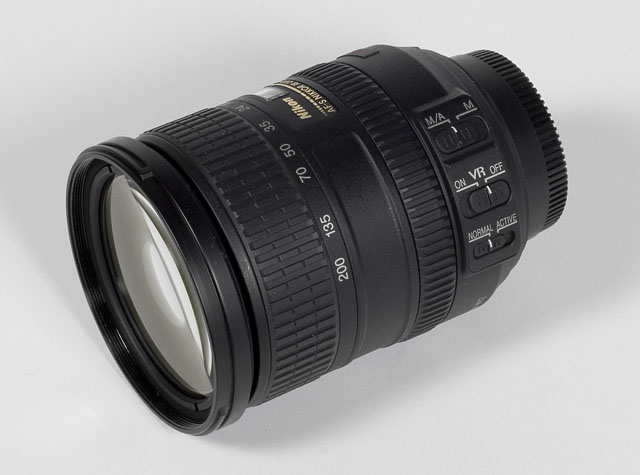|
Nikkor AF-S 18-200mm f/3.5-5.6 G IF-ED VR DX - Review / Test Report |
|
Lens Reviews -
Nikon / Nikkor (APS-C)
|
|
Page 1 of 3
Review by Klaus Schroiff, published April 2006
Introduction
The Nikkor AF-S 18-200mm f/3.5-5.6 G IF-ED VR DX is one of the hottest products of
the season and as such in extremely scarce supply. Some very positive reviews elsewhere
on the web fired the demand even further. As a consequence the prices
over at eBay tend to be way beyond the MSRP at the moment (spring 2006).
It is a designated DX lens with a reduced image circle so it is only
compatible to APS-C DSLRs. The effective focal length is equivalent to 28-300mm
on full frame SLRs. Regarding its extreme 11x zoom ratio it is obviously meant
as an all-round lens.

The optical construction is made of 16 elements in 12 groups including two ED
(Extra-low Dispersion) and three aspherical elements.
The minimum focus distance is 0.5m resulting in a max. object magnification of 1:4.5
at 200mm. The filter size is 72mm. The aperture mechanism feature 7 aperture blades.
Thanks to its rather slow max. aperture the lens is very compact (77x97mm) and
light-weight (560g) despite the extreme zoom range.
One key selling feature is -naturally- the 2nd generation VR (Vibration Reduction)
mechanism. The camera motion is detected by 2 gyro sensors which measure the angle and
speed of the shake. This information is used to shift a lens group off the optical axis
(a forced decentering) to counteract this motion. The result is a significant improvement
of handholdability under extreme conditions. Nikon claims a potential equivalent to 4 f-stops.
The lens offers two VR modes - a "normal" mode for most situations incl. static scenes, object
tracking as well as monopod shots whereas the 2nd "active" mode to compensate more pronounced
vibrations (e.g. shooting from a moving vehicle).
When the camera is mounted on a tripod the VR should be switched off on this lens.

Regarding its rather steep price tag the build quality is somewhat disappointing
with lots of rather average quality plastics. It´s not remotely
comparable to the pro grade lenses within the Nikon lineup. The zoom action
is very uneven across the range and it suffers from zoom creeping when
tilted downward. The focus ring feels quite smooth but it isn't really damped.
The AF-S 18-200mm is a G-type lens so it doesn't feature a dedicated
aperture ring anymore (selected solely on the camera).
As you can see above the lens uses a duo-cam design to extend towards the
long end of the zoom range. Adding the supplied petal-type hood almost doubles
the total length of the lens. Thanks to an IF (Internal focusing) design
the front does not rotate so using a polarizer is no problem.
The lens features a silent-wave (ultrasonic) AF motor resulting in
fast and near silent AF operations.
| Specifications |
|---|
| Equiv. focal length | 27-300 mm (full format equivalent) |
| Equiv. aperture | f/5.3-f/8.4 (full format equivalent, in terms of depth-of-field) |
| Optical construction | 16 elements in 12 groups inc. 3 aspherical and 2 ED elements |
| Number of aperture blades | 7 (rounded) |
| min. focus distance | 0.5 m (max. magnification ratio 1:4.5) |
| Dimensions | 77 mm x 96.5 mm |
| Weight | 565 g |
| Filter size | 72 mm (non-rotating) |
| Hood | HB-35, petal-shaped, bayonet-mount (supplied) |
| Other features | Optical stabilization (VR II), Silent-wave AF drive |
|